












 Dr Rejaul Karim Barbhuiya Assistant Professor, Central Institute of Educational Technology (CIET), NCERT, Ministry of Education, Government of India
Dr Rejaul Karim Barbhuiya Assistant Professor, Central Institute of Educational Technology (CIET), NCERT, Ministry of Education, Government of India

Times have changed. Today is not the time of memorising and copying. Students must be enabled to think for themselves and articulate their thoughts well. They should be able to participate meaningfully and confidently in day-to-day activities – whether it be buying groceries, registering a formal complaint, or voicing opinions freely. A problem-solving attitude, critical outlook, scientific temperament and creativity are non-negotiable skills in the 21st century.
The National Education Policy 2020 talks about technology playing an important role in improving the learning outcomes and learning experiences of children. With the growing penetration of the internet and the easy availability of smartphones and other electronic devices, both parents and teachers can participate in and supervise children's learning through various online apps, quizzes, videos, e-books, educational games and so on. In a nutshell, digital learning has the potential to impact on what children learn and how they learn.
Aakash Chowkase
In the post-Covid world, more than ever before, the parents' role is being seen as pivotal to children's growth and learning. The National Education Policy 2020 released by the Government of India, recognises parents as equal partners in their children's education. At home, it is important for caregivers to create a safe, engaging and positive environment for children to learn, apply themselves and have fun. Parents can also engage actively with children around their homework, curricular and co-curricular activities and projects.
NEP 2020 acknowledges the multilingual reality of India and asserts that the bridge of home language or other familiar language is absolutely crucial for children in the foundational years, not only to help them to comprehend basic subjects, but also to acquire additional languages like English. Thus, the needs-based and systematic use of learners' home languages should be encouraged in the classrooms, along with an anxiety-free, purpose-oriented and input-rich environment.
Aparna Dixit Head of Content and Research, Centre for Learning Resources
 Ms Sonia Kumari Assistant Professor, Kamala Nehru College, University of Delhi
Dr
Post-doctoral Research Fellow, University of California, Berkeley, USA, Department of Psychology
Ms Sonia Kumari Assistant Professor, Kamala Nehru College, University of Delhi
Dr
Post-doctoral Research Fellow, University of California, Berkeley, USA, Department of Psychology
Thanks to globalization and the emergence of technologies, international boundaries have become blurred. English, to a high degree, is a commonly understood medium of communication. It is one of the key tools that students need to perform well today and in the future. According to a global study, while recruiting, 98.5% of employers implicitly or explicitly assess a candidate’s English communication skills! There is therefore a growing demand for English communication skills, because it empowers people and enables them to lead a better life.
Functional communication skills, involving aspects of LSRW (listening, speaking, reading and writing), are central to knowledge acquisition, children’s intellectual, social and emotional growth, and life-long learning. Specifically, strong listening and speaking skills are not only vital in the overall language learning process, but also lead to better reading and writing skills. Yet, these foundational skills tend to be neglected in schools due to the high pupil-teacher ratio, lack of oral language-focused assessment, and most importantly, a lack of systematic and allocated practice time for these skills within the classroom.
Aligned with NEP 2020, NCERT learning outcomes and standardized to CEFR (Common European Framework for Reference) levels, Uolo Speak is a hybrid learning program that focuses on building, applying, practising, and assessing these core language skills.
First, through this book as one of the components of the program, the English classroom becomes an avenue to hone functional speaking skills in real time. The teacher-led activities give learners the opportunity to undertake high-quality, level-appropriate, and experiential activities that help to build confidence and expression in English.
Second, the mobile interface of the product ensures consistent practice of functional LSRW skills. These exercises go beyond traditional question types and employ cutting-edge technology to enable learning and generate instant feedback. For instance, learners practise speaking with Al (artificial intelligence), as if conversing with a real person!
Third, Uolo Speak assessment can be conducted by the school in sync with their academic calendars. The assessment is evaluated by Uolo’s English specialists to give performance report and feedback.
Finally, the reporting methodology used in the above three program components, generates a skill growth chart against CEFR levels for each learner, class and the school. Educators can then clearly identify learners who are reaching, meeting, and exceeding the level requirements, and support them accordingly.
Uolo Speak is a powerful, exciting, and unique experience for learners and teachers. It represents a real life and results-oriented approach to develop essential 21st century functional English skills.
Wishing all teachers, parents, and learners lots of fun and joyful experiences as you embark upon this exciting journey with Uolo Speak.
Dr Laraine O'Connell
D. Litt., English, North West University, South Africa
I am a veteran English teacher and lecturer, with a great love for English and for teaching. I have taught English and trained teachers over many years. I live in South Africa and it is a wonderful experience working with a company promoting the learning of English in India.

Part A is period 1. It has one text and one classroom activity.
E-Speak section has two mobile app projects. These projects can be done at home or in school.

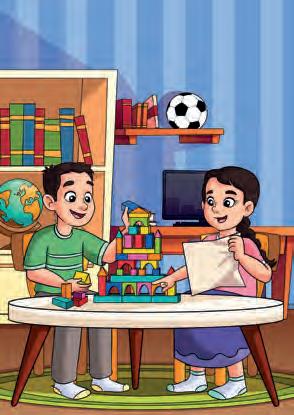
Part B is period 2. It has one fun activity and one presentation task.

Chapter number and name




Animation video
Text






Keywords















1 Ask and Answer Asking questions and responding to them
2 Group Discussions Participating in group discussions
Ask questions starting with what, where, why, when and how Respond to questions
Follow one another during a group discussion
Extend the group discussion in a coherent manner
3 Describing Events Describing an event
4 Giving a Short Speech Giving short motivational speeches
Answer questions about an event/incident

Describe an event with a few details
Appreciate key ideas in a motivational text
Give short motivational speeches
5 Give Instructions Giving instructions
Retell a process in simple words
Give step-by-step instructions in order to guide someone or get something done
6 Expressing Feelings Expressing feelings on a certain issue
7 Hear My Slogans Saying slogans
8 Explaining What and Why Stating cause and effect
Appreciate another person/character's feelings and responses
Share personal feelings, ideas and emotions on an issue
Appreciate the impact of slogans Present slogans on important issues
Identify the cause and/or effect of an event
Explain the cause and/or effect of an event 9 Can You Convince? Persuasive speaking
Listen to and interpret key details in informational texts
Speak persuasively about the advantages or disadvantages of something
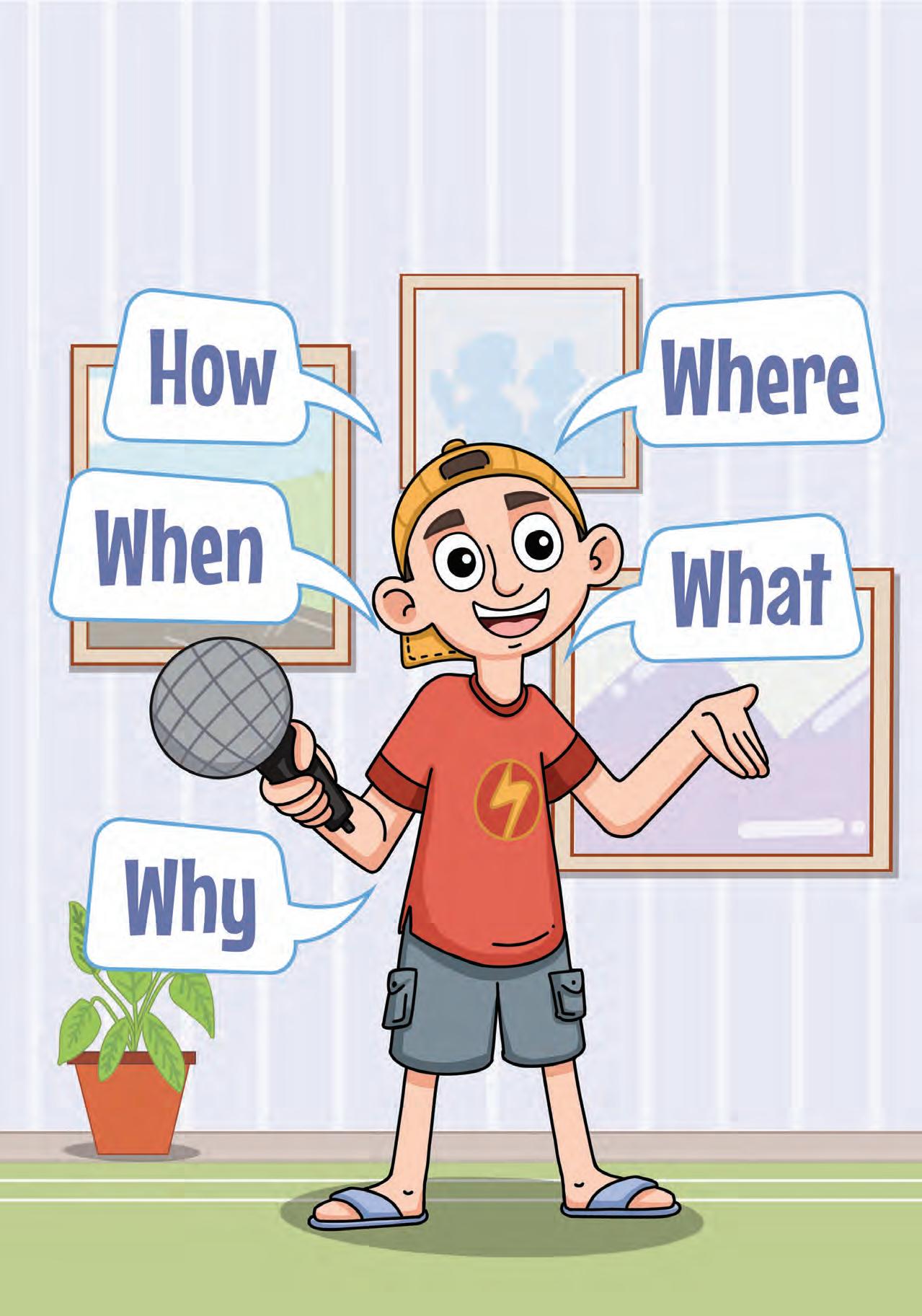
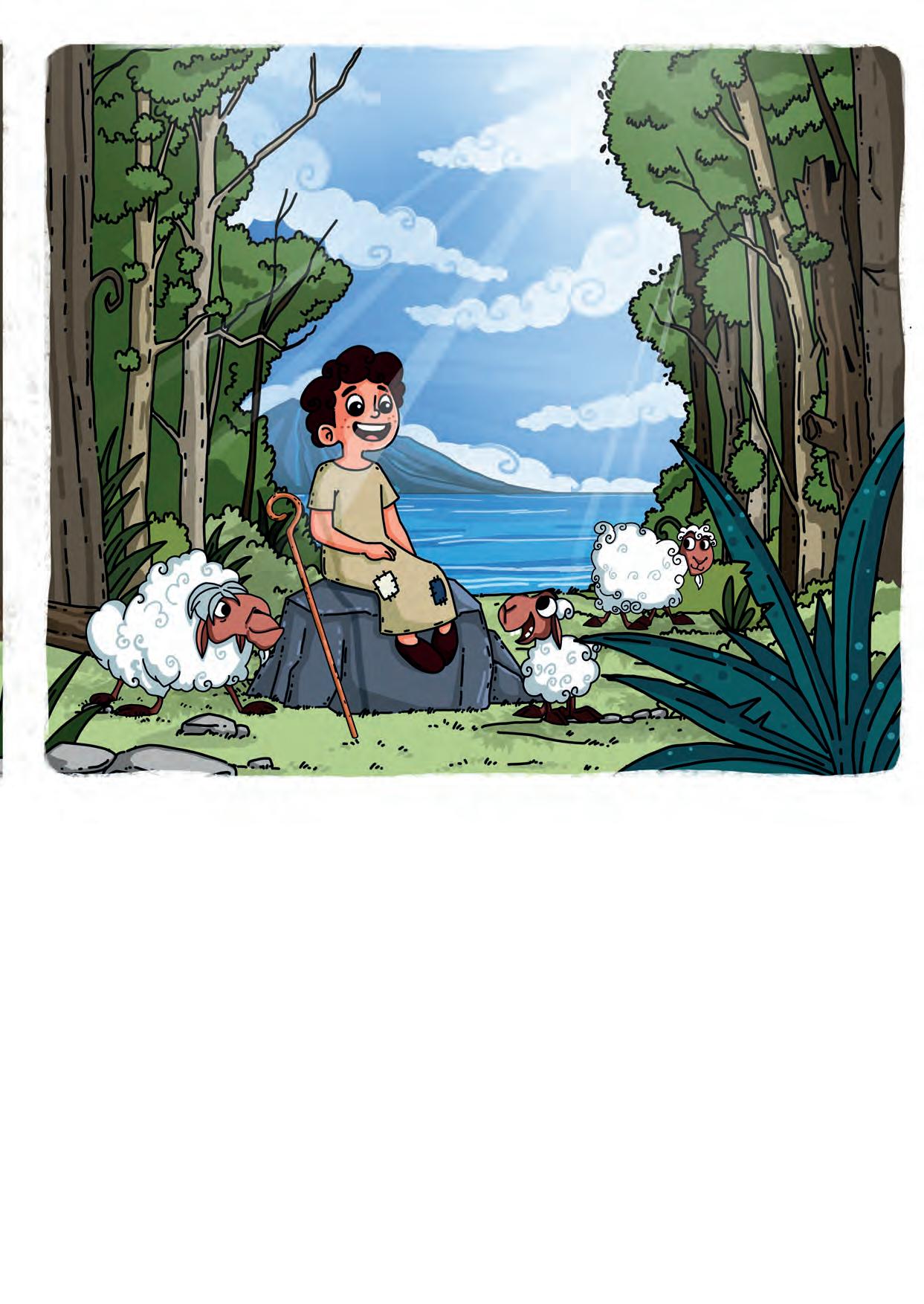





Boost your speaking!

Your teacher has secretly thought of some items. Ask questions to guess what they could be. Here is an example.









What is it used for?
It is used to clean our faces or to wipe our hands.
What is it made of?
It is usually made of cotton.
Is it big or small? Is it heavy or light?
It is small and very light!
Bingo! It’s a handkerchief!

Your questions can be about its use, shape and size, where it is found, and what it is made of!


Out of all the items the teacher thought of, how many did you guess correctly?
Write their names.




You meet your class teacher in your neighbourhood. She seems a little confused. How can you help her?

You are attending a carnival in the neighbourhood. Suddenly, you spot your uncle passing by. You have not met him in a long time.
What questions would you ask him? Record any FOUR or FIVE questions with appropriate expression and gestures.
How many differences can you find? You have only one minute to find them.






Movie actor: . (answer the second question)

Interviewer: . (ask the last question)

Movie actor: . (answer the last question)

Interviewer: Thank you so much for .
Movie actor: It was my pleasure to .
Interviewer: Now, can we take a selfie, please?
Movie actor: .
Practise: In pairs, prepare for your parts. Enact the conversation with expression and gestures. 3
4
Present: Now, it’s time to present your blockbuster interview to the class. Use the following tips to make your presentation interesting.

Speak with appropriate expression and body language. You can use some props to get into the character of the movie actor or the interviewer.

Rate each presentation!
Write your friend’s name
Write your friend’s name
Write your friend’s name

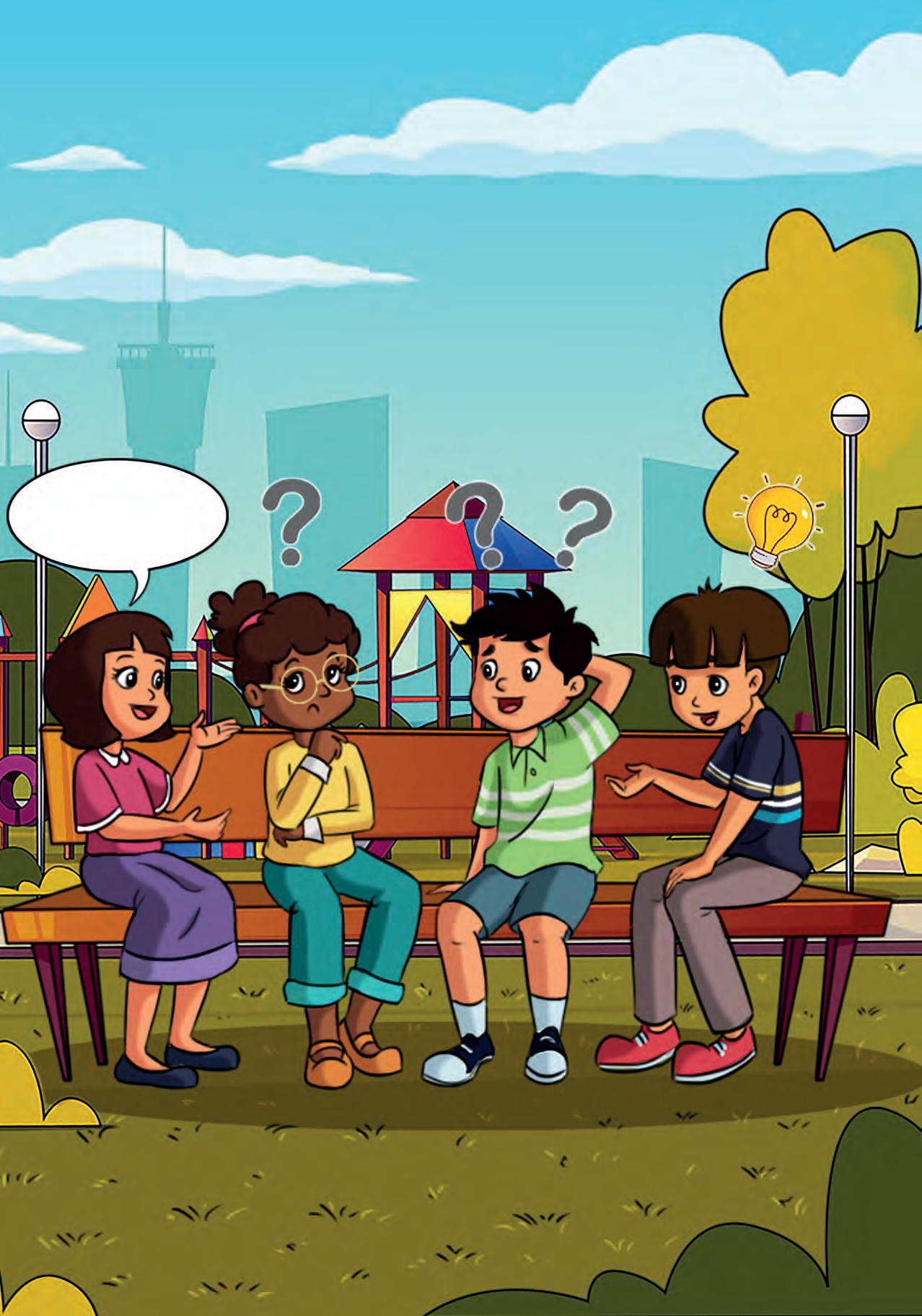
Teacher: The holidays are around the corner. Are you excited?
Sujata: Yes, Ma’am! It’s a long holiday so we’ve planned a lot of things for ourselves.

Teacher: I’m sure you have. But I also want you to use this time to learn something new. So, I will be giving you some holiday homework. I want you to decide what type of homework you want.
Niharika: Ma’am, that’s a great idea but how will we decide?
Teacher: You can discuss in groups of four and present your ideas.
Aarav: Yes, Ma’am!
Sujata: I think regular school homework like reading chapters or solving questions from our textbooks is good holiday homework.
Aarav: I don’t agree with that. We anyway do that every day. Why not do something creative during the holidays? Like reading about something that we find interesting and writing an essay on it. Or maybe we can do some creative writing.
Ritwik: I think we shouldn’t have any homework at all! Holidays should be a time for rest and enjoying with family and friends. We should get to play and do whatever we want.
Niharika: I would like to work on a project; something that is related to the real world. I like learning about new things. So, I would love to gather information on something relevant and make a presentation on it.
Sujata: That sounds interesting. We could make a project and decide what each person’s role could be. What do you think is a fun topic?
Aarav: What about our school trips? Should we write about which one was a favourite and why?
Niharika: Umm… not everyone goes on school trips so it wouldn’t be fair to them. Let’s think of something else.
Sujata: You’re right. What about doing a project on the upcoming festivals? We could read different magazines on festivals and talk to people about how they celebrate it.

Ritwik: That sounds like a fun idea. If we get to know more about the festival, we can enjoy it even more. What do you think, Niharika?
Niharika: I also think that could be a fun project. I could research about the festival’s origin and historical background! Ritwik could help me with that.
Aarav: That’s brilliant! I would like to interview different families. Each family celebrates the festivals differently. For example, in my family, we share gifts with all the relatives on the day of the festival.
Sujata: You are right! My family usually makes sweets, cakes or other dishes; and shares them with our friends and neighbours. Aarav, I can help you interview the families.
Niharika: That sounds fantastic! Then, let’s suggest that we want to do a project on festivals. [They share the idea with their teacher.]
Teacher: Well, that’s interesting! I am so glad that you had a fruitful discussion with the group and came up with such creative solutions.

Boost your speaking!

We read some thoughts on how children want to spend their holidays. How would you like to spend your holidays and why? Share your thoughts with the class.
learning a new form of art
helping others
learning to cook
learning to ride a bicycle
Example:
learning music
reading different books
During my holidays, I want to pick up a cooking skill.
I think it is very important to learn to cook. It helps us be independent.
I will try new dishes and cook some delicious food.
playing a new sport gardening




Nikhil said, “Single use plastic items do not decompose.” Listen to Komal’s response to the statement. Then, record it.
Your friends have planned a discussion on the topic “Everyone should learn to play one musical instrument.” Share your thoughts on the topic.


Get into pairs.


Write: With your partner, make notes on what you think. 3

Name of the topicOur thoughts-


Practise: Discuss your topic with your friends and family. Try to know their thoughts too. 4
Present: Now, along with your teacher, participate in the group discussion on the topic you chose. The teacher will begin the discussion. 5
In the group, express your thoughts clearly and politely. Listen carefully to other group members when they speak and respond accordingly.

Treat everyone’s viewpoints with respect.

Rate each presentation!
Write your friend’s name
Write your friend’s name
Write your friend’s name
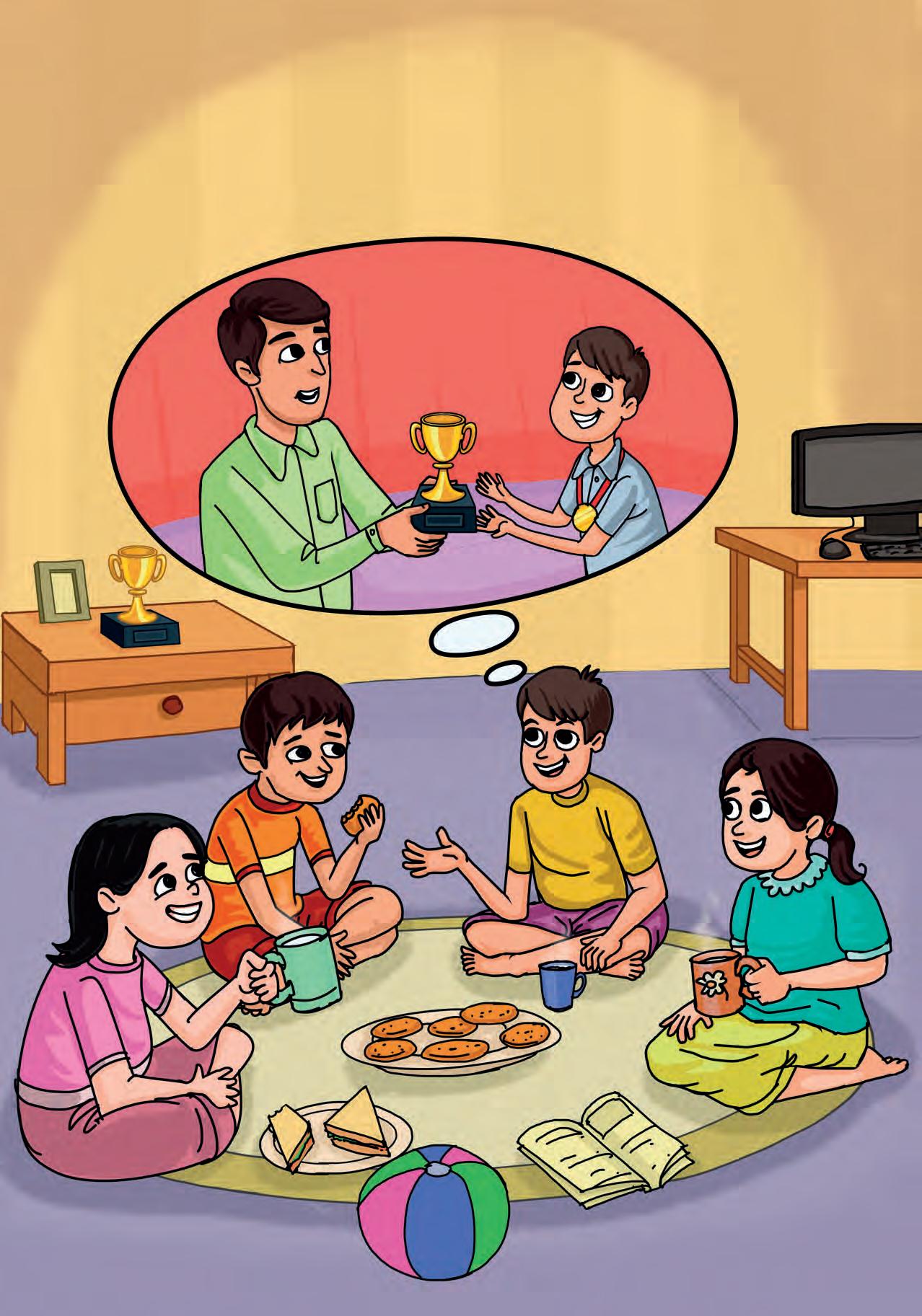

exhausted (eg·zaws·tid): very tired explore (ek·splor): walk around in an unknown place to learn more about it relieved (reh·leevd): no longer feeling worried or tensed trembling (trem·buhl·uhng): shaking with fear


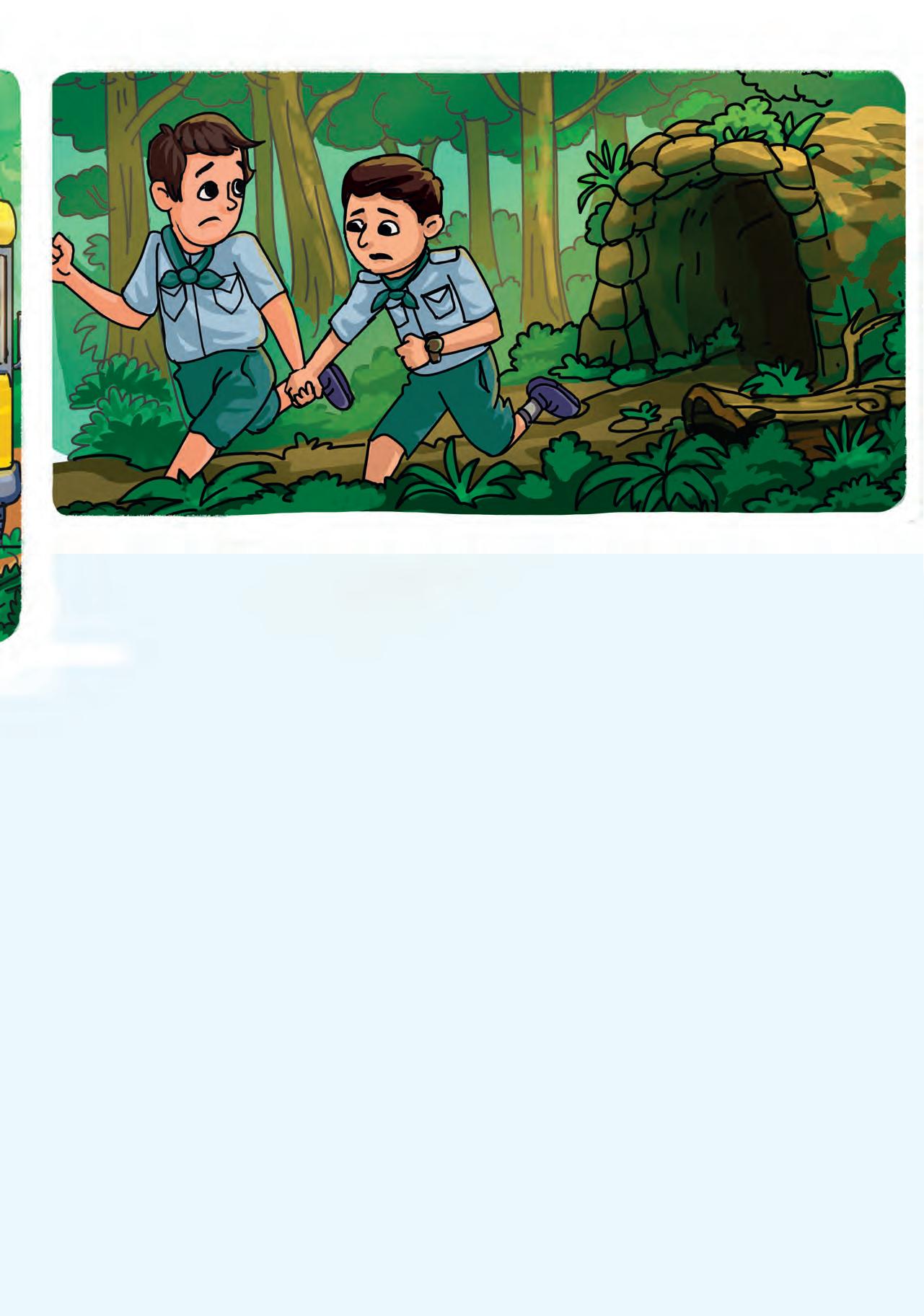



Think of a time when you were very scared. In class, share the incident that made you scared.
scary frightening jumped in horror screamed trembled once upon a time ran froze with terror
Step 1: Start by greeting your friends.
Step 2: Set the tone. Tell what you are going to talk about.
(Today, I will tell you about… /I want to share with you all… /This is about the time when…)
Step 3: Give some details of events.

(What happened? Where it happened? How it happened?)
Step 4: End by greeting your friends.
Speak with facial expressions and hand gestures. Modulate your voice while speaking to make it interesting for the listeners.




Listen to the story about the day Ishaan won a gold medal on sports day. Now record it yourself.
Share your experience about the last time you got hurt or injured. Talk about the incident in 3–4 sentences.
Fill in the blanks with the missing object to complete the relation. One has been done for you.
TOE : FOOT : : : HAND FINGER
SOFA : CUSHION : : : PILLOW 1
THREAD : CLOTH : : WOOL : 2

WINGS : AEROPLANE : : : BUS 3

TOP : SKIRT : : : PANTS 4
SAND : DESERT : : WATER : 5
Think of a funny incident that happened in your life. Write down what happened and present it to the class.
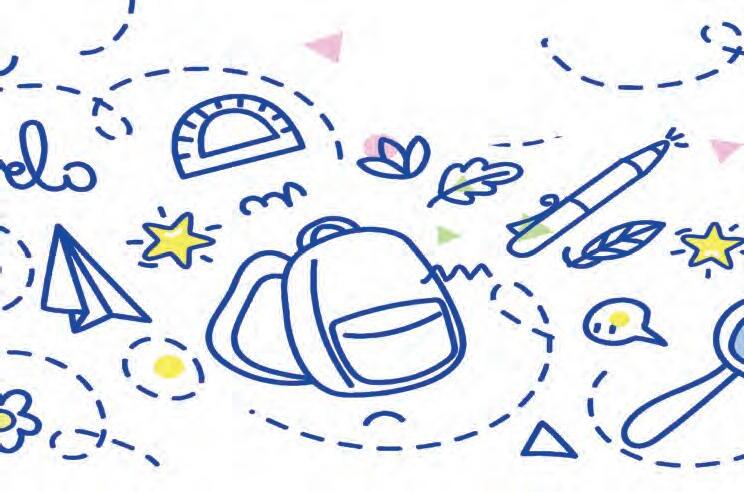

Think about a funny incident. Then, think of the given questions. 1
What happened?
Who was with you?
Write: Describe what happened. Follow the hints. 2
Where did the incident happen?
(start with greetings)

(mention where it happened, when it happened and who you were with)

(describe what happened in 2-3 lines)

. .
(closing greetings)
Speak clearly and with feelings. Enact the scene, if you can.



What a speech!
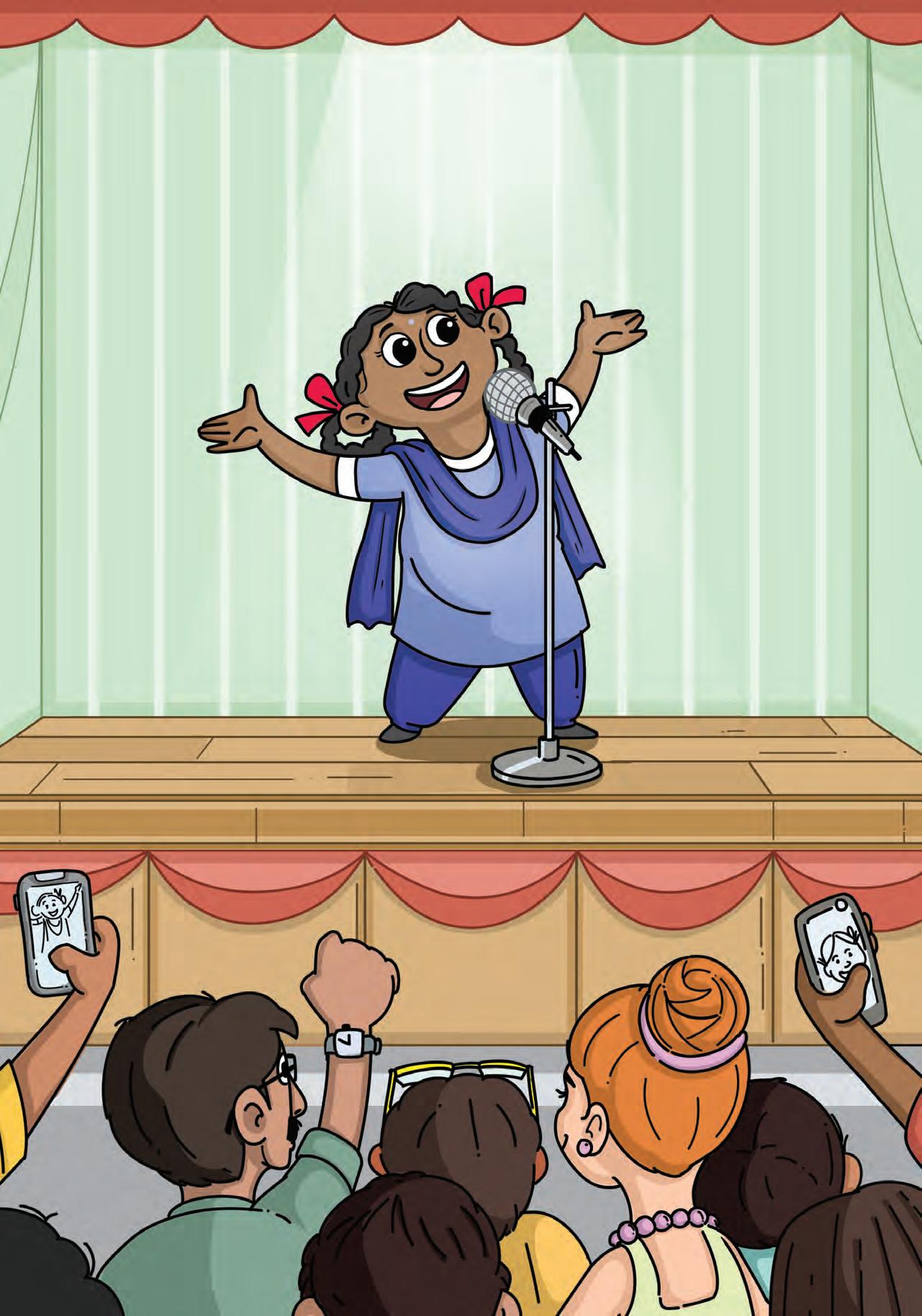
Stay strong!
Yes, we can!


Think of a title that you would like to give Dr Kalam. Present your title to the class and give a reason for your choice.
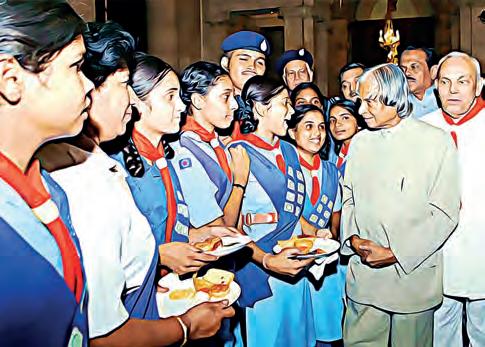

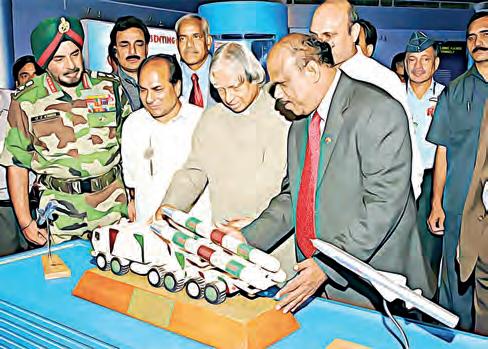
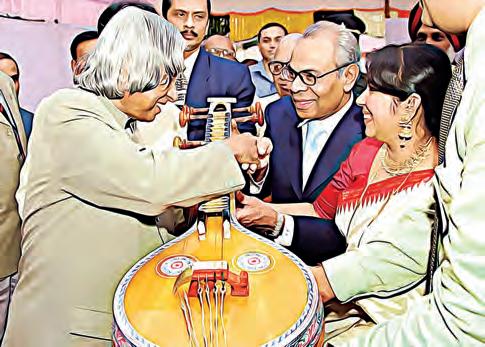
For example-
Hello everyone! I would like to give him the title ‘The Man Who Lives in Our Hearts’ because he will always be remembered for good work he did.
Look at the following pictures for hints:






Meet Miss Lalitha who works as the Head Nurse at The Mark Hospital. Listen to her inspiring story to understand how she helped hundreds of COVID patients to recover. Then read it aloud with expression.
Your friend worked hard but lost the inter-school singing competition. Give a short speech to motivate your friend.




 teacher
teacher
Step 4: How will I make it happen?
Practise: Present your speech to the family. Refer to the tips below to make it more interesting. Practise many times.

Speak clearly and with feeling.
Make eye contact with your audience.
Use an enthusiastic tone of voice and body language to keep the audience engaged.

In the end, ask the audience if they feel inspired.
Present: Give a short and engaging speech to tell about your dreams.
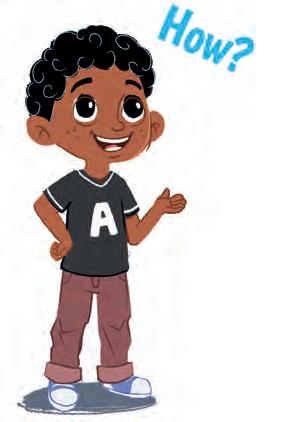


Rate each presentation!
Write your friend’s name Write your friend’s name Write your friend’s name

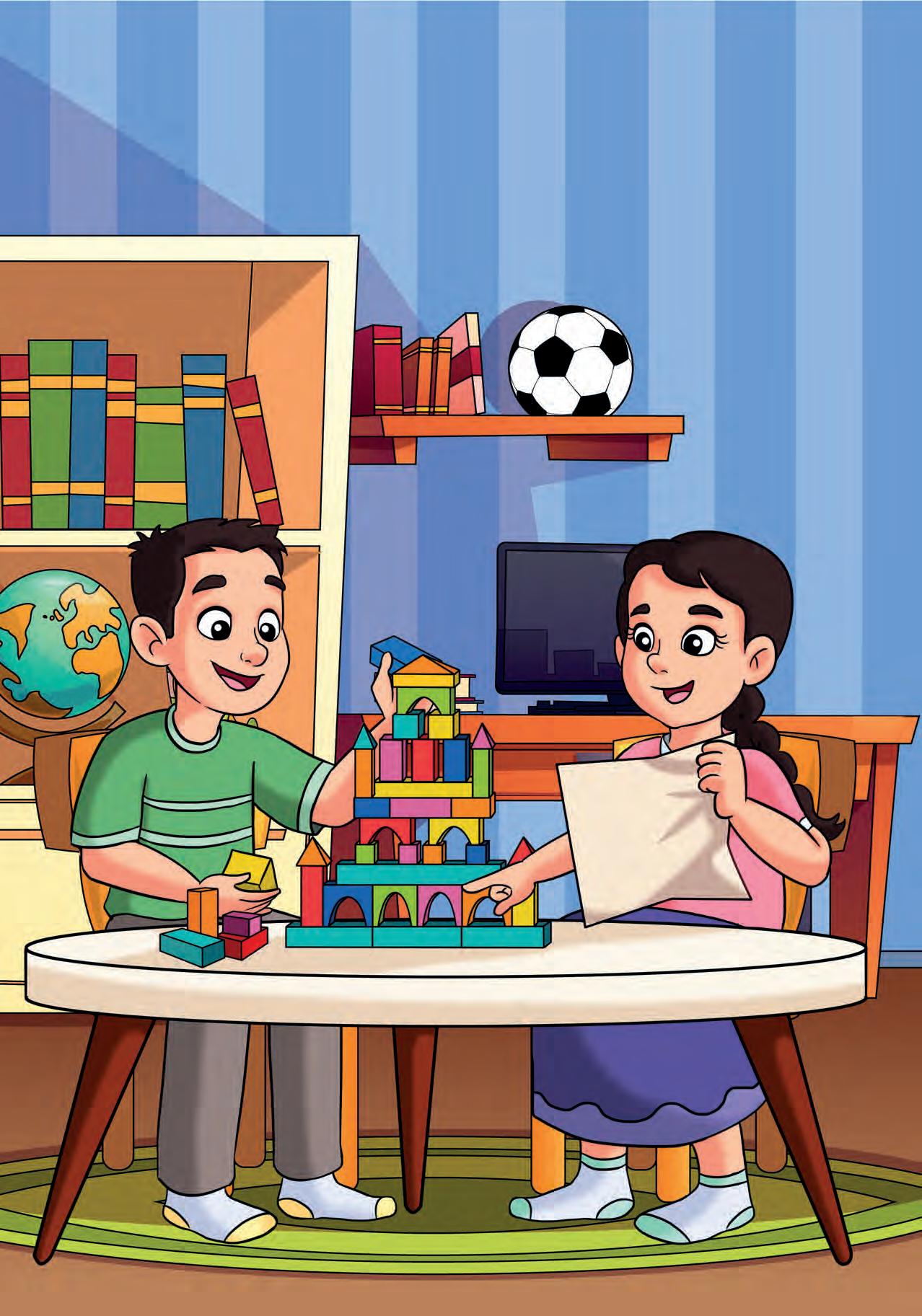
“Isn’t the title catchy?” asked Pranav excitedly!
“Isn’t the title catchy?” asked Pranav excitedly! “Oh yes! It does sound great for our article!” exclaimed Gurpriya. The friends had put their old notebooks to good use and made a beautiful object out of them. If you would also like to make use of any waste paper or your old notebooks, keep your eyes glued to what’s coming next. So, let’s begin.
“Oh yes! It does sound great for our article!” exclaimed Gurpriya. Both the friends had put their old notebooks to use and made a beautiful object out of them. If you would also like to make use of any waste paper or your old notebooks, keep your eyes glued to what’s coming next. So, let’s begin.
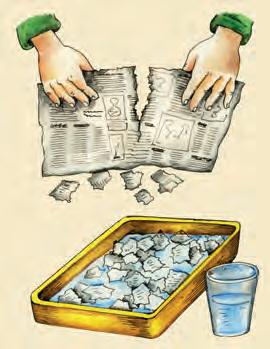
“Isn’t the title catchy?” asked Pranav excitedly!




Follow the instructions carefully, and soon your new recycled object will be ready!
Follow the instructions carefully, and soon your new recycled object will be ready!
“Oh yes! It does sound great for our article!” exclaimed Gurpriya. Both the friends had put their old notebooks to use and made a beautiful object out of them. If you would also like to make use of any waste paper or your old notebooks, keep your eyes glued to what’s coming next. So, let’s begin.
Step 1: Firstly, tear the waste paper into small pieces.
Follow the instructions carefully, and soon your new recycled object will be ready!
Step 1: Firstly, tear the waste paper into small pieces.
Step 2: Next, add these pieces to a bowl of water.
Step 2: Next, add these pieces to a bowl of water.
Step 3: Rub and mash the wet pieces with your hands properly for about 20 minutes or until the mixture becomes very smooth and pulpy.
Step 3: Rub and mash the wet pieces with your hands properly for about 20 minutes or until the mixture becomes very smooth and pulpy.
Step 4: After that, take 1 cup of flour and 1 cup of water. Mix them together in another bowl.
Step 4: After that, take 1 cup of flour and 1 cup of water. Mix them together in another bowl.
Step 5: Then, add 1 teaspoon of salt and some more water. Mix well until the mixture is smooth.
Step 5: Then, add 1 teaspoon of salt and some more water. Mix well until the mixture is smooth.
Step 6: Next, put the paper pulp into the flour mixture. Mix it well and knead it to make a dough.
Step 7: Then, take a bowl and tightly cover its reverse side with a plastic cling film wrap.

Step 8: After that, spread the dough over the plastic-covered surface of the bowl to form a thick layer.
Step 9: Lastly, set it aside and let the layer dry for 2 days. Once completely dry and hard, pull it away from the plastic cling wrap carefully.
Step 9: Lastly, keep it aside and let the layer dry for 2 days. Once completely dry and hard, pull it out from the plastic cling wrap carefully.
Your beautiful waste paper Recycled Bowl is ready for use!
Your beautiful waste paper Recycled Bowl is ready for use!
“I will keep my lovely new bowl on my desk! I will keep my crayons in it,” said a thrilled Pranav.
“I will keep my lovely new bowl on my desk! I will keep my crayons in it,” said a thrilled Pranav.
“Good idea! I’ve decided to give mine to my sister,” said Gurpriya proudly.
“Good idea! I’ve decided to gift mine to my sister,” shared Gurpriya proudly.
.





Pick any ONE of the recycled items and share the steps to make it.
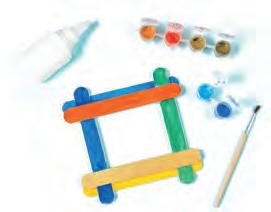
Boost your speaking! take paint let it dry share

cut paste reuse wrap decorate glue together
Materials required:
• old cup or glass
• glue
• scissors
• coloured paper

• old newspaper
• decorative materials
Materials required:
• Ice-cream sticks
• cardboard
• glue
• coloured paints
• decorative material
• a photo
Don’t worry if you are not sure of all the steps. Give it a try!
Use full sentences while presenting. Use sequence words like first, then, after that, next and finally. Get creative and share the steps of making the craft in your own style.

Practise at home!
Naina is going grocery shopping all by herself. Listen to her mother’s instructions to her and then record them.




Share the instructions for washing clothes in 4–5 steps.
Look at the map and follow the directions to guess the places. The first one has been done for you.

You are here
1. Go straight along the Main Road. Turn towards the south at the West Street. Then, turn west at the Station Road. It’s next to the bookshop.
You’ve reached the .

2. Go straight along the Main Road. Turn south on the Middle Road. Then, turn towards west on the Station Road. It’s next to the Post Office.
You’ve reached the p .
3. Go straight along the Main Road. Go past the bakery and the toy shop. It’s at the end of the road, opposite the red house.
You’ve reached the s .
Pick any ONE option of your choice and write down its instructions. Share it in the classroom.
Write: Tick (ü) any ONE of the given options of your choice and complete the instructions. You can write your own instructions too. 1

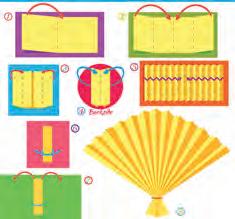
1. Fold

2. Then,
3. Next, fold and press .
4. Finally, open .
5. Decorate .
1. Cut .
2. Squeeze .
3. Pour .
4. Add . 5. Stir .
1. Take a .
2. Collect the


3. Tie
4. Check to see
5. Put the .

Practise: Say these instructions aloud to your family members and friends. Practise saying the instructions clearly and loudly.


Present: In class, tell the option you chose. Share the instructions that should be followed.
Speak loudly and clearly. You can also do the actions.

Rate each presentation!
Write your friend’s name
Write your friend’s name
Write your friend’s name

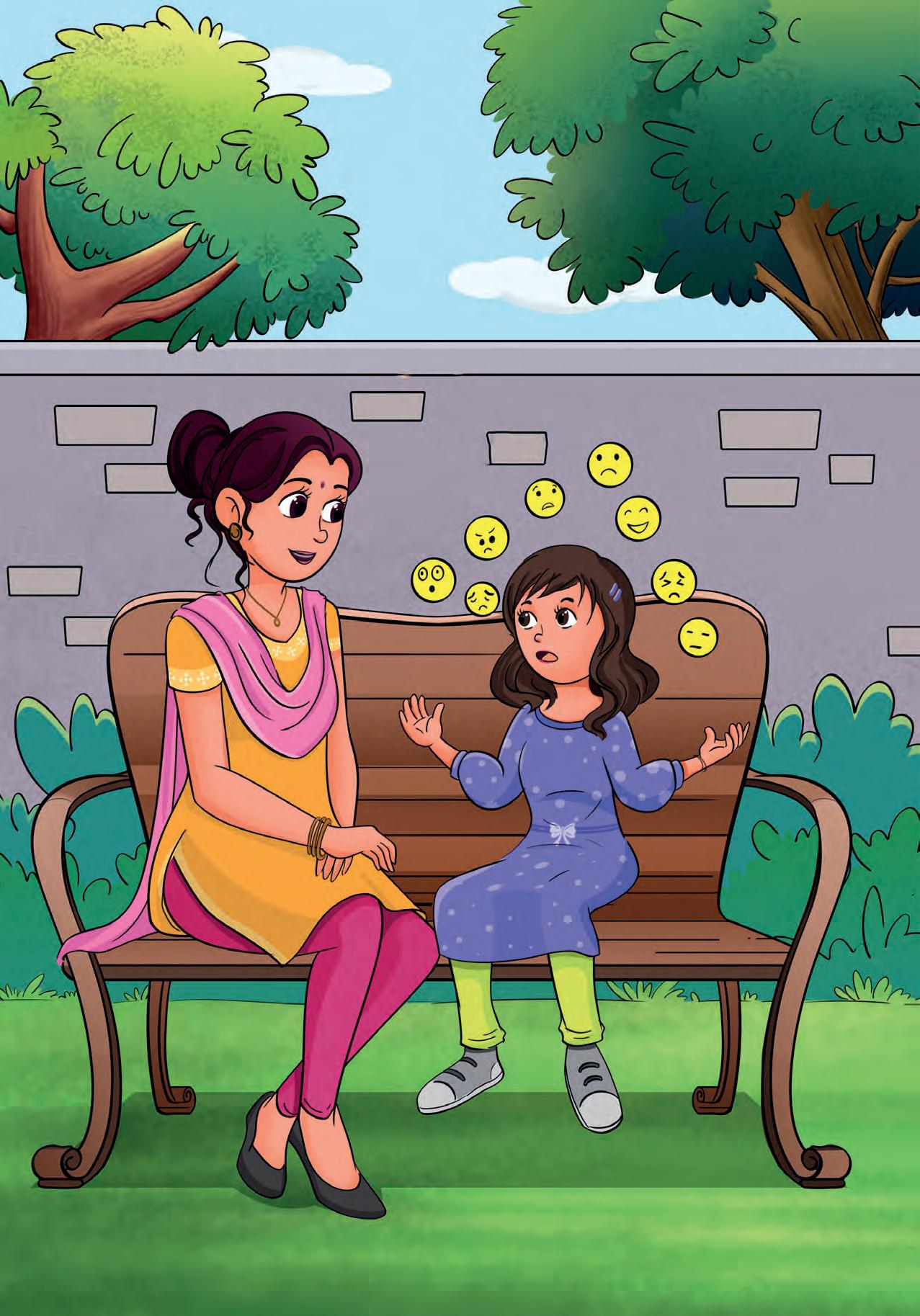

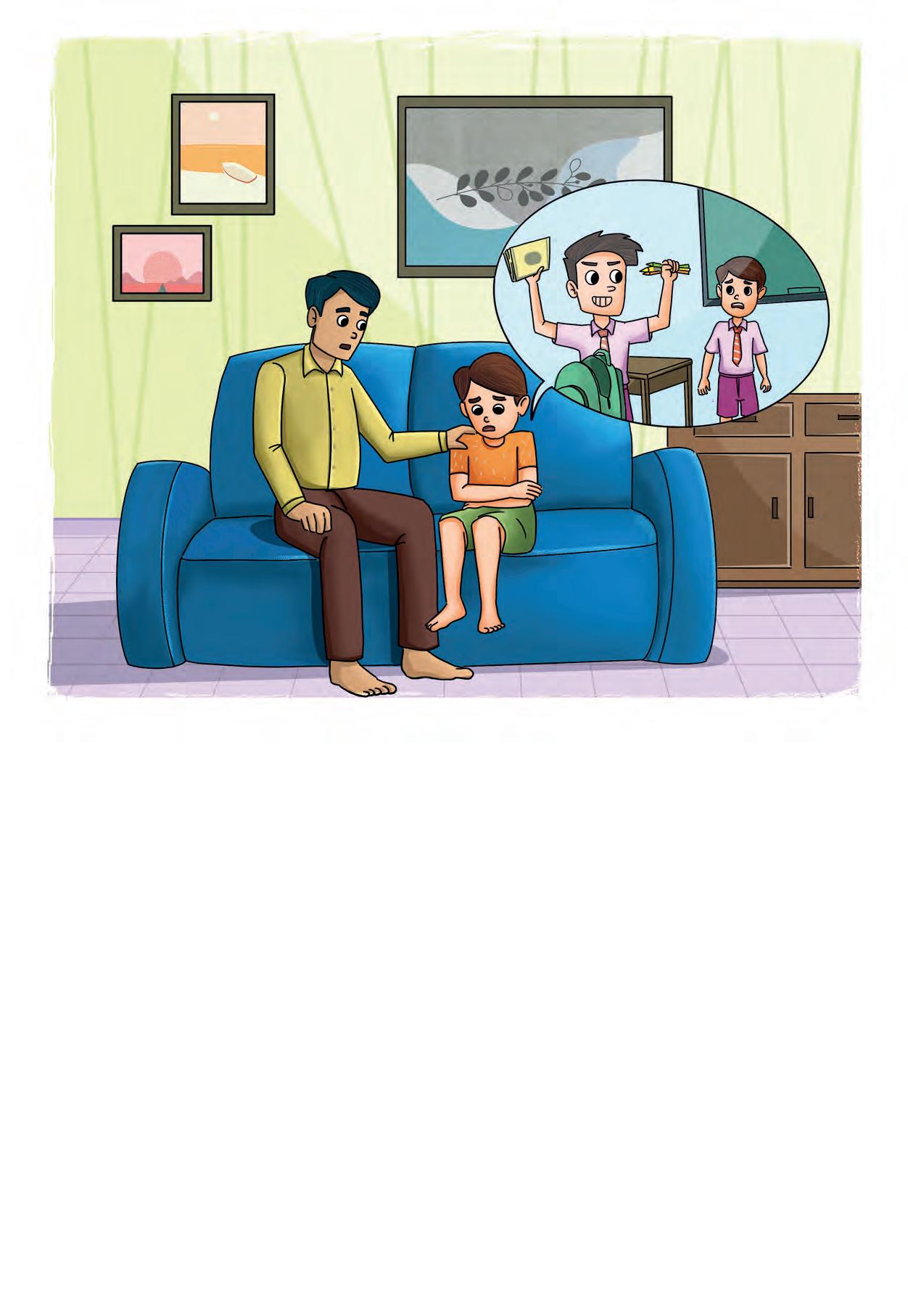

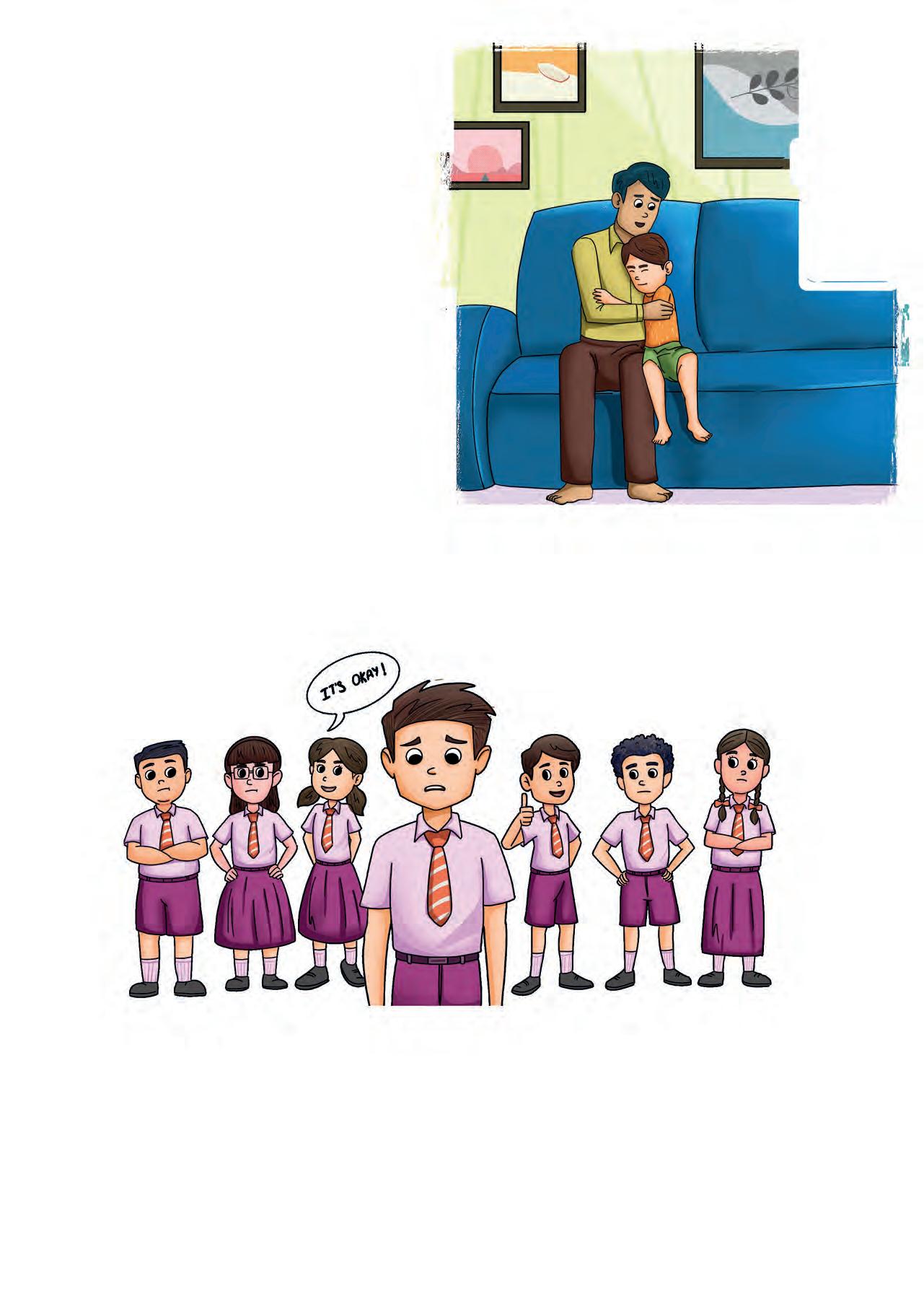


Look at the examples of bad behaviour shown in the pictures. What will you say to someone who behaves like this?
tease someone
use things without asking
make a noise in the class
push someone
kick the garbage bin
Excuse me
It is not right to…

throw garbage on the street
This may be funny to you, but…
Could you…




Practise at home!
Listen to why Kiran feels jumping the queue is bad. Then, record it.
Your cousin wears your clothes without asking you. Tell in 2–3 sentences how you would politely ask him to stop doing it.

Make FOUR different words from the word CATERPILLAR. One is done for you.
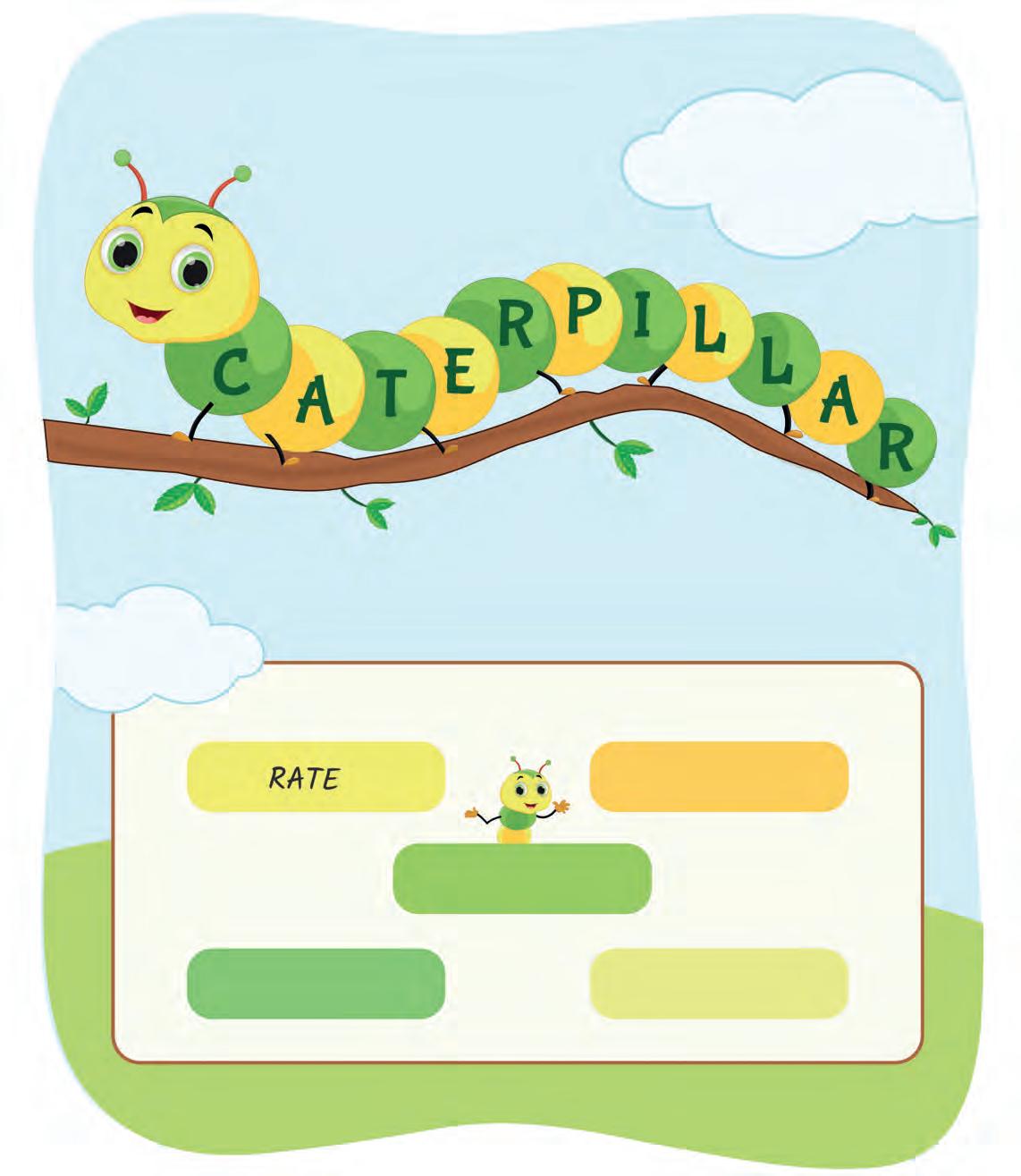



Imagine yourself in any ONE of the situations given below. Write what you would feel and say in that situation. Then, share it with the class.

1Look at the situations given below. Tick (ü) any ONE situation that you want to talk about. Think about how the situation would make you feel.

You helped someone in your class.
You had a fight with a friend.
You gave a friend their favourite book as a gift.

You won the first prize.

Write: Now, describe your feelings. It could be an imaginary event.
Hello everyone!
(write how you felt)
Thank you.
(write the situation)
(write why you felt that way)
Today I will talk about the time when . I felt because . . .
(share a bit more about your feelings)
Practise: Say these lines in front of an elder or a friend. Speak with appropriate expressions. 3

Present: It’s time to present! Tell your friends how you felt in the given situation. 4

Read from the book if needed. Use actions and expressions to talk about your feelings.
Rate each presentation!
Write your friend’s name
Write your friend’s name
Write your friend’s name







Boost your speaking!



Read these slogans on different hobbies. Now, make a short slogan on your favourite hobby.







Sports is where you find A healthy body with a healthy mind. With sports we all unite, More sports is what we’d like!



Write your slogan here






Painting nature and daily objects is a fun thing to do.

The colours bring alive So many beautiful views!
Use rhyming words to write the slogans. Chant the slogan with expressions and energy.








E-Speak











Project



Vote For Me

55 Chapter 7 • Hear My Slogans
Use the images as hints to guess the names of the sports. One has been done for you. + + + 10 S


Answer –
Answer –
Answer –
Answer – Table Tennis + + + + H O +
Answer –
Make a slogan on a theme of your choice. Practise saying it with expressions at home. Finally, present your slogan in the class.

1
Pick a theme on which you would make a slogan.
Healthy Habits
• Going to bed on time
• Eating good food
• Exercising
Be Kind to Animals
• Hungry
• Sick
• Helpful
2
Plant More Trees
• Less pollution
• Pure air
• Healthy
Say No to Plastic
• Adds to waste
• Danger to animals
• Pollutes oceans
Write: Write down your slogan in the space provided below.
Hello everyone, my name is .
The theme of my slogan is .
My slogan is:
Thank you.

Practise: Say the slogan at home in front of your family using actions and expressions.


Present: Now, it’s time to share your slogan with the class.
Make sure to speak loudly and clearly. Use actions and expressions while presenting your slogan. Modulate your voice to make your slogan more interesting.


Rate each presentation!
Write your friend’s name
Write your friend’s name
Write your friend’s name

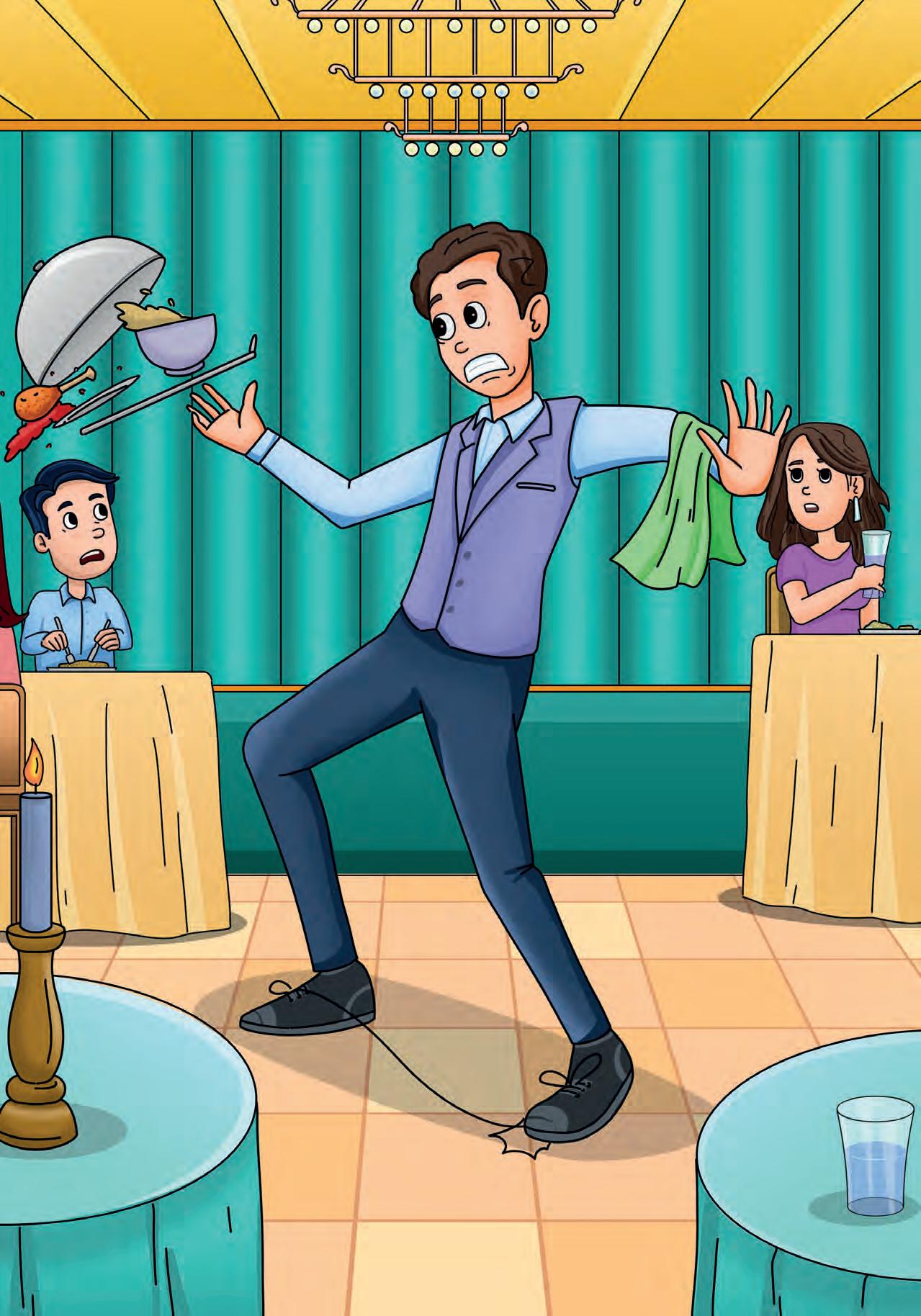



Boost your speaking!


Think of TWO more reasons why Nikhil’s father could have been late. Share them in the class.
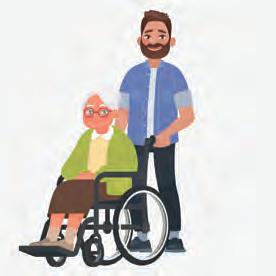
Example:
Nikhil’s father was late because he had to attend a birthday party after office.
Nikhil’s father was late because his car had a punctured tyre.
Look at the pictures for hints.

You can give other reasons too, but make sure they are logical. Speak in complete sentences.

Listen to what happened to Lalit’s rose plant. Then, record it.




Baani was feeling very tired and sleepy after school yesterday. Tell us why this could have happened.


Hello friends!
I have selected picture number 3.


I can see that Lata got wet in the rain.
As a result, I think, she might catch a cold. She will also miss school the next day. Thank you.
Write: Now, write what can happen next.
I have selected picture number .
I can see that .
(give the description of the picture)
As a result, I think, .
(tell what might happen next)
Thank you.
Speak loudly and clearly.
Speak with expressions.
Point towards the picture while speaking.







Boost your speaking!


You have read all about smartphones. Do you think smartphones are useful for children? Share your thoughts in the class.
Disadvanatages
screen time
Advanatages
connectivity
entertainment eyes strain

emergency addiction
internet lazy
dangerous knowledge cyber bullying
pictures and videos
personal details
quick maps and directions
Use facial expressions and hand gestures while presenting your thoughts.



Listen to the description of the latest model of a smartphone. Then read it aloud with vocal and facial expressions. Remember that you have to sell it!


Project

Choose a product — anything that you use every day. Share some of its pros and cons with your audience to make them aware of the product.
Project


Topic:
Student 1: For: Student 2: For:


The 'Conversations' book follows a unique spiralling approach that systematically builds language skills and enables children to express themselves verbally in real-world situations, thus preparing them for the needs of the 21st century world. Each chapter focuses on building specific and age-appropriate English language competencies by weaving together activities that are contextual, experiential, joyful, and research-based.
• Activity-based Learning: The book offers joyful and experiential activities that build English communication competencies.
• Texts as per NEP 2020 themes: The book has exciting and stimulating texts that pave the way for English communication activities.
• Tech Integration: The book works in sync with the digital world, where various other activities and projects are undertaken. Learner outputs are evaluated through an AI-based speech recognition engine.
• Assessment of Speaking & Listening as per CEFR: The program includes special assessment that allows systematic reporting on growth of English language skills as per the CEFR.

• Teachers’ Manual: The book is complemented by the Teachers’ Manual that enables teachers to conduct each session effectively.
Uolo partners with K-12 schools to provide technology-based learning programs. We believe pedagogy and technology must come together to deliver scalable learning experiences that generate measurable outcomes. Uolo is trusted by over 8,000 schools with more than 3 million learners across India, South East Asia, and the Middle East.